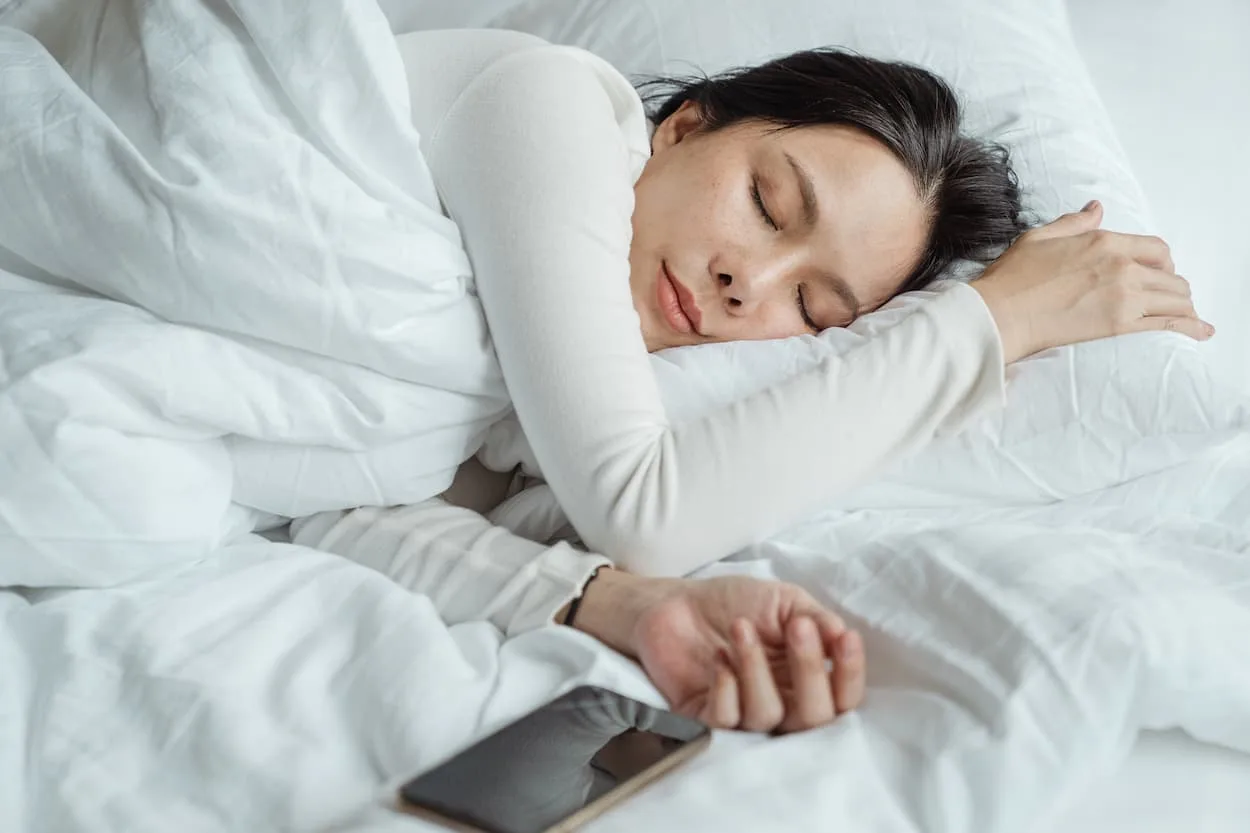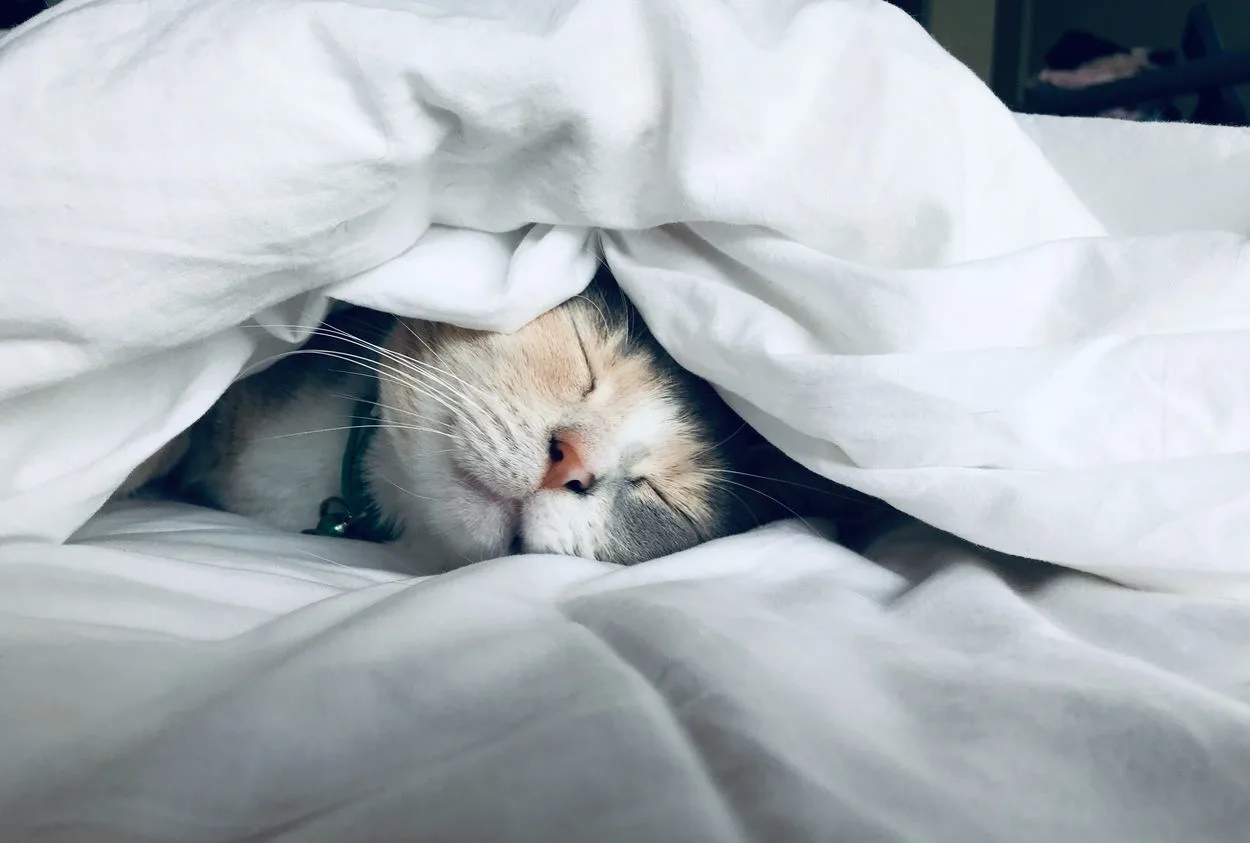They mean the same thing, I can’t imagine a situation where, for example, one is preferred over the other. Let’s discuss them with the help of examples to make them more clarified and for that purpose, I would like to give you two situations.
“I was asleep” and “I was sleeping” mean the same. The difference lies in their tenses. “I was sleeping” is used in the continuous tense, whereas “I was asleep” is used in past simple tense with an adjective complement (asleep).
In the first situation, let’s assume that someone asks you “What did you do at midnight yesterday?” And you answer that by saying “I was asleep” or “I was sleeping.” Here it is imminent from the text that both of them mean the same thing in context, that the person speaking was sleeping during the inquired time.
Keep reading to know more.
What is the difference between sleeping and asleep

In “I was asleep” the verb “to be” is in the past and it acts as an adjective complement, in contrast to “I was sleeping” where the verb “sleep” is in the past continuous tense and means that you were sleeping in the past and now you are awake.
The same answer may not apply to other tenses. If you specify a time, you are more likely to use “asleep” in the simple perfect tense. Because the action or situation “I have been asleep for around seven hours” is complete.
Since the present perfect continuous with time usually implies that the person is still asleep, we are less likely to say “I slept 7 hours.” And how can you say something consciously when you are asleep?
But, for example, if it’s a repetitive behavior over a long period of time, you might say: “I only slept seven hours a night this week. I usually sleep around eight hours a night.”
How do you use asleep and sleeping in a sentence?
Sleep is considered to be a state where usually there is inactivity or rest phase of the voluntary muscles, loss or absence of consciousness, and cessation of sensory activity in the body.
When talking about sleep in a sentence, it can be either a noun or a verb. Here, we are going to provide you with some examples of their use as nouns in sentences:
- “William’s sleep is often interrupted by nightmares.”
- “You will have a delightful mood, once you get up from a relaxing night’s sleep.”
- “Peace of mind and avoiding the disturbing thoughts are necessary for a good night’s sleep.”
Examples of using it as a verb in a sentence are:
• “I always go to sleep early.”
• “A baby does not sleep comfortably during the phase of the first 5 months.”
• “Students usually sleep late during exam sessions because they have a lot of studying to do overnight.”
On the other hand, the word sleep is used as an adjective or adverb in a sentence. It is used as an adverb to mean sleeping, and as an adjective to mean being in a dream state without being aware or conscious of it.
Examples of such sentences could be:
• “I fell asleep as soon as my head touched the pillow.” (As an adverb, it is usually used with the verb “to fall”.)
• “He was sleeping when his friends visited.” (Used here as an adjective.)
‘Sleep’ refers to the act of falling asleep, and ‘asleep’ refers to the state of being already asleep. Possible examples would be:
- I’ll sleep later.
- I fell asleep while watching TV.
- I get annoyed and angry whenever my sleep is disturbed.”
The word “sleep ” comes from the Old English word “slaep” or “slaepan” from the Proto-Indo-European stem “sleb” meaning “weak”. The word “sleeper”, on the other hand, comes from the same basic word and was first used in the 1200s.
The word sleep comes in different forms, depending on the tense used. For example, if you were to use ‘Sleep’ in the past tense, it would be “slept”.
Below are the different forms of sleep in different tenses.
| Infinitive | to sleep |
| Present Tense | sleep/sleeps |
| Past Tense | slept |
| Present Participle | sleeping |
| Past Participle | slept |
Which is more correct: Have you sleep or have you slept?

“Have you sleep?” is not correct. The word “to have” in this sentence is an auxiliary verb and must be followed by the past participle of the verb “sleep”, that is, “slept”. Otherwise, it doesn’t really make sense in grammatical order.
“Had you slept” is incorrect. However, if it had contained a time clause, for example: “Had you slept before 8 pm last night?” It would’ve been more proper as it inquired whether you slept at that certain time.
“Have you sleep” and “Had you sleep” on the other hand have no proper meaning and are incorrect no matter which way you look at them.
If you want to ask if someone has slept or not, the right question is “Did you sleep?” This is the past tense structure. Here, “did” is used with the third form of the verb to form interrogative sentences.
Now, if you want to ask at what time in the past someone fell asleep, you would express the question like this: “When did you sleep?”
I was asleep vs I was sleeping
“I was asleep” and “I was sleeping” generally mean the same thing: that the speaker was sleeping at the time of an event. E.g “I was asleep when my favorite show came on” or “I was sleeping when my favorite show came on.
The only difference between them is the tenses used. In “I was sleeping”, the past continuous tense of “sleep” was used. This indicates that the act of “sleeping” was continuing in the past.
“I was asleep” on the other hand, indicated the completion of the act of sleeping because of the use of the adjective complement “asleep”.
The usage of sleep also differs between the two sentences. In “I was sleeping”, “sleeping” was used as a verb to indicate the act of sleeping in the past. In “I was asleep”, “asleep” was used as an adverb to relate the act of sleeping in the past. (e.g I was asleep when you called)
Definition-wise though, they both mean the same thing.
Conclusion
In short, there’s not much difference between the sentences “I was asleep” and “I was sleeping”. They both mean the same thing, that at the time of an event, the person speaking was in the state of “sleep”.
For example: “I was asleep when mom called.” Makes no difference when you say “I was sleeping when mom called.”
There’s no superior sentence either. Whether you choose to use “I was asleep” or “I was sleeping”, you will still relay the same message.
The difference lies in their tenses and usage. “I was sleeping” is used in the continuous tense, whereas “I was asleep” is used in past simple tense with an adjective complement (asleep).
Other Articles
- WHAT IS THE DIFFERENCE BETWEEN DO NOT AND DON’T?
- CALL ME BEN” VS “CALL BEN FOR ME”: WHICH IS RIGHT?
- HOPE YOU’VE HAD A GOOD WEEKEND VS HOPE YOU HAD A GOOD WEEKEND USED IN EMAIL (KNOW THE DIFFERENCE)
- THE DIFFERENCE BETWEEN BRITISH PEOPLE WITH BRI-ISH ACCENT AND A BRITISH ACCENT (FIND OUT)
Click here to learn more about these difference through the web story in this link.

